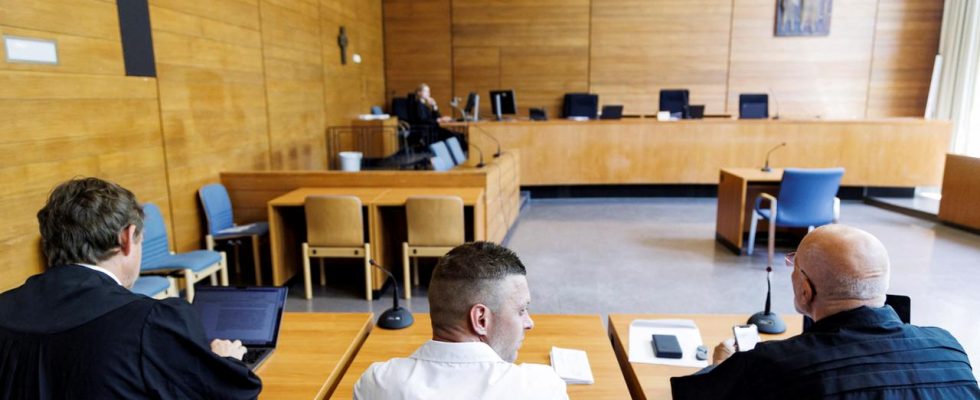Does the Catholic Church have to ex-Pope Benedict XVI. Pay compensation to a victim of sexualised violence? The district court of Traunstein sees the church as liable. Now it is about the amount of the compensation.
The procedure for compensation for a victim of sexualized violence in Traunstein is not a short process. The proceedings are dragging on, also because the defendant Archdiocese of Munich and Freising is not satisfied with the statements made by the person concerned to assess the amount of the payments. There should be a psychiatric report for this. The court does not expect a verdict to be reached this year. Conciliation negotiations had previously failed.
The lawyer for the plaintiff, 39-year-old Andreas Perr, had previously stated that the boy was completely thrown off course by the sexualized violence he suffered in the mid-1990s. He had sought refuge in drugs and alcohol. It must now be clarified what can be attributed to the sexualised violence suffered.
The deed of the former local pastor of Garching an der Alz, Peter H., was made possible because those responsible for the Archdiocese of Munich and Freising reinstated the perpetrator in communities despite corresponding allegations and judgments, according to the plaintiff’s argument. The presiding judge now explained that in principle she sees a liability claim against the archdiocese. As the employing body, this is to be held responsible for the damage resulting from the abusive act.
Lawsuit is also directed against Ratzinger
The procedure caused a stir because one of the earlier responsible persons in the case was Cardinal Joseph Ratzinger, who later became Pope Benedict XVI. The lawsuit was also directed against him, although he always denied having had anything to do with H.’s pastoral work. However, since no one has inherited the pope, who died at the end of 2022, and would therefore also take over the proceedings, the lawsuit against Benedict XVI. separated. Whether there will ever be a verdict here is more than questionable.
A statement by the presiding judge, who sees Cardinal Ratzinger’s complicity in the case, was noteworthy. In 1980, the later Pope, as Archbishop of Munich and Freising, took part in a meeting at which it was decided that H. would move to Munich. That’s why he had “appropriate knowledge of the previous life” of the priest. And yet the man was then taken over “without further restrictions and precautions” and continued to work in the pastoral care of children and young people.
The fact that no agreement or decision was reached in the other proceedings in Traunstein is initially disappointing for those affected. After all, they had hoped that the Upper Bavarian court would follow the line of a Cologne court. Here, too, as in Traunstein, the lawyers saw official liability on the part of the church as a given. The judges in Cologne therefore sentenced the Archdiocese of Cologne to pay damages of 300,000 euros. The framework for compensation for damages and pain and suffering in the case of acts of sexualized violence has thus been shifted significantly upwards.
The previous upper limit for recognition services to those affected in the Catholic Church was 50,000 euros. In reality, there were already six-digit amounts that were called in particularly serious cases. On average, however, those affected have received 22,000 euros in recent years.
High hurdles in court
It has always been argued that the 50,000 euros are based on the upper frame of the civil law compensation table and corresponding court decisions. The expectation of the Advisory Council of the German Bishops’ Conference that an improvement in the recognition system is now essential is correspondingly clear. The time for alms must come to an end. The Independent Commission for Recognition Services (UKA), which decides on the amount of the payments, was also open to a review.
But the hurdles in court are higher. For example, it must be proven that damage was caused by the sexualized violence and not by others. In the Church’s recognition procedure, it is usually sufficient for the information provided by the person concerned to be plausible. There are also additional legal costs in court.
In the Traunstein case, the “Sauerteig” initiative said it had collected 25,000 euros to finance the legal costs. In Garching an der Alz, she is committed to reappraisal. Peter H. worked there as a pastor for two decades.
grape juice instead of wine
The Peter H. case is one of the most prominent cases in Germany, also because it is linked to Ratzinger. The latter was archbishop in Munich when the decision was made that Peter H. from Essen could come to Munich. Later, as prefect of the Congregation for the Doctrine of the Faith, Ratzinger allowed Peter H. to use grape juice instead of wine in Mass.
The Archdiocese had requested a special permit because H. had committed acts of abuse under the influence of alcohol. While the plaintiff sees evidence here that Ratzinger knew about the deeds and did not act, the former Pope’s secretary Archbishop Georg Gänswein explained that Ratzinger’s signature on the approval does not prove that the cardinal also read the letter at the time.

